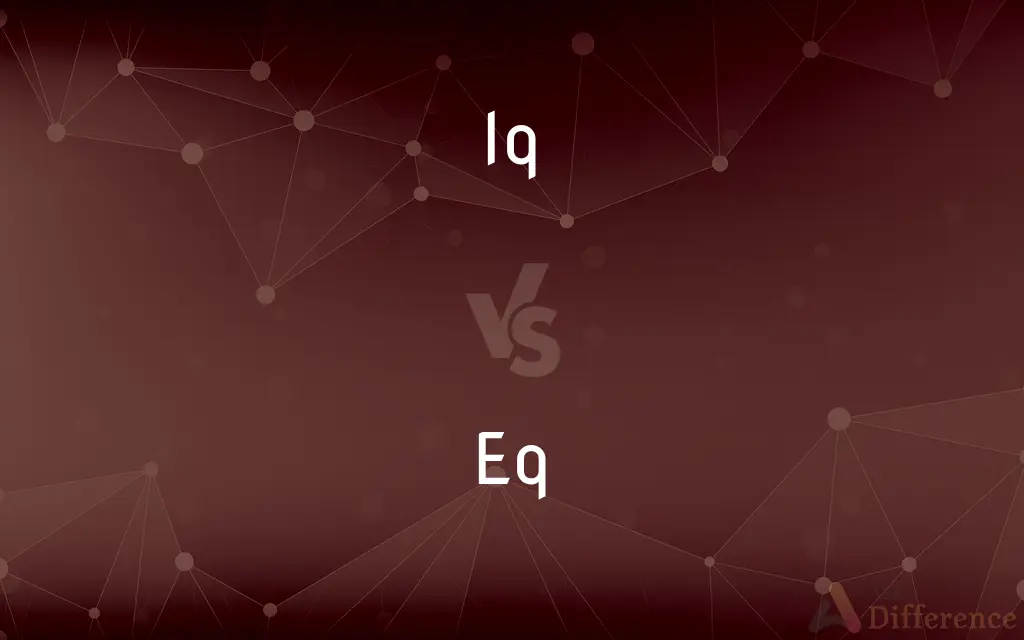IQ vs. EQ — What's the Difference?
By Tayyaba Rehman — Updated on September 20, 2023
IQ refers to intellectual intelligence, measuring cognitive abilities. EQ (Emotional Intelligence) assesses one's ability to recognize, understand, and manage emotions.

Difference Between IQ and EQ
Table of Contents
ADVERTISEMENT
Key Differences
IQ, which stands for Intelligence Quotient, is a numerical representation of an individual's cognitive abilities. This metric has been widely used in various educational and professional realms to gauge problem-solving skills, logical reasoning, and abstract thinking. Typically, standardized tests determine IQ scores, aiming to measure an individual's intellectual prowess compared to the general population.
On the other hand, EQ stands for Emotional Intelligence. This pertains to an individual's ability to perceive, understand, and manage not only their emotions but also those of others. EQ encompasses skills such as empathy, interpersonal relations, and self-awareness. While IQ might determine how one can solve a complex puzzle, EQ can indicate how one navigates social scenarios or copes with emotional challenges.
While IQ tests provide a quantifiable score reflecting one's cognitive capabilities, EQ is more qualitative, focusing on emotional awareness and control. It's widely accepted that having a high IQ can be advantageous academically or professionally, but a high EQ offers benefits in social interactions, leadership roles, and personal well-being.
In society, there has been a growing recognition of the importance of EQ alongside IQ. While having a high IQ can predict academic achievement, EQ plays a crucial role in predicting success in social and emotional aspects of life. Many experts believe that a balance of both IQ and EQ is ideal for overall success in various spheres of life.
Comparison Chart
Definition
Measures cognitive abilities
Assesses emotional understanding and management
ADVERTISEMENT
Test Type
Standardized, quantifiable
More qualitative, often based on self-assessment
Focus Area
Logical reasoning, problem-solving, abstract thinking
Empathy, self-awareness, interpersonal skills
Usage
Academic and certain professional assessments
Leadership roles, social scenarios, personal well-being
Influence on
Predicts academic and some professional achievements
Predicts social success and emotional well-being
Compare with Definitions
Iq
A measure of cognitive abilities.
Her IQ score placed her in the top 2% of the population.
Eq
A measure of emotional understanding and management.
Her high EQ makes her an empathetic therapist.
Iq
An index of intellectual prowess.
People with a high IQ often excel in logical reasoning tasks.
Eq
Reflects interpersonal and intrapersonal skills.
With a strong EQ, he effortlessly navigates social situations.
Iq
Reflects an individual's capacity for abstract thought.
His high IQ is evident in his ability to solve complex problems.
Eq
Indicates the ability to perceive emotions in oneself and others.
His EQ helps him understand his team's feelings and motivations.
Iq
A standardized score derived from intelligence tests.
He scored 130 on the IQ test, indicating above-average intelligence.
Eq
Encompasses empathy and self-awareness.
His high EQ is evident in his deep connections with others.
Iq
Represents problem-solving and analytical skills.
Her impressive IQ makes her an excellent strategist.
Eq
Represents emotional awareness and control.
Her EQ allows her to stay calm under pressure.
Iq
A measure of a person's intelligence as indicated by an intelligence test; the ratio of a person's mental age to their chronological age (multiplied by 100).
Eq
Emotional intelligence.
Iq
A measure of a person's intelligence as indicated by an intelligence test; the ratio of a person's mental age to their chronological age (multiplied by 100)
Eq
Abbreviation of equation
Eq
The atomic weight of an element that has the same combining capacity as a given weight of another element; the standard is 8 for oxygen
Common Curiosities
Is IQ fixed throughout life?
While IQ can remain relatively stable, certain factors, like education and environment, can influence it.
Can EQ be developed or improved?
Absolutely, through experiences, reflection, and training, one can enhance their EQ.
Does EQ play a role in leadership?
Yes, strong EQ is often seen in effective leaders, as it aids in understanding and managing team dynamics.
Are there any drawbacks to having a very high IQ?
A very high IQ can sometimes come with social challenges or heightened sensitivities.
How is IQ typically measured?
IQ is usually measured using standardized tests that assess various cognitive skills.
Can one have a high IQ but a low EQ?
Yes, it's possible for someone to have strong cognitive abilities (high IQ) but struggle with emotional understanding (low EQ).
How do cultural differences impact EQ assessments?
Cultural norms can influence emotional expression and understanding, potentially affecting EQ assessments.
Which is more important, IQ or EQ?
Both have their significance; IQ often relates to academic/professional success, while EQ influences social success and well-being.
Can one's EQ influence their mental health?
Yes, a higher EQ can aid in recognizing, understanding, and managing emotions, benefiting mental health.
What's the average IQ score?
An average IQ score is typically set at 100 on most scales.
Can children be assessed for EQ?
Yes, there are tools and methods to gauge emotional intelligence in children.
Why has EQ gained attention in recent years?
As workplaces and societies value interpersonal skills and emotional well-being, the importance of EQ has been highlighted.
Do most schools assess students' IQ?
While not all, many schools use IQ-type tests for placement or identifying gifted students.
Share Your Discovery

Previous Comparison
Polyurethane vs. Lacquer
Next Comparison
Prayer vs. WorshipAuthor Spotlight
Written by
Tayyaba RehmanTayyaba Rehman is a distinguished writer, currently serving as a primary contributor to askdifference.com. As a researcher in semantics and etymology, Tayyaba's passion for the complexity of languages and their distinctions has found a perfect home on the platform. Tayyaba delves into the intricacies of language, distinguishing between commonly confused words and phrases, thereby providing clarity for readers worldwide.
















































